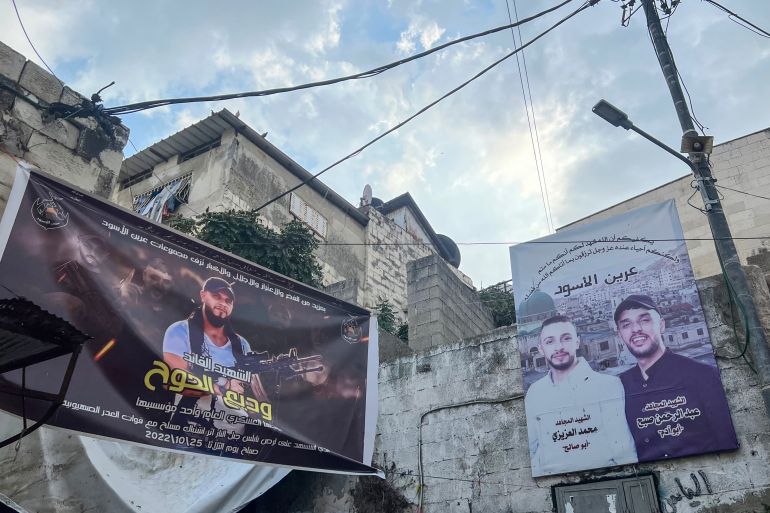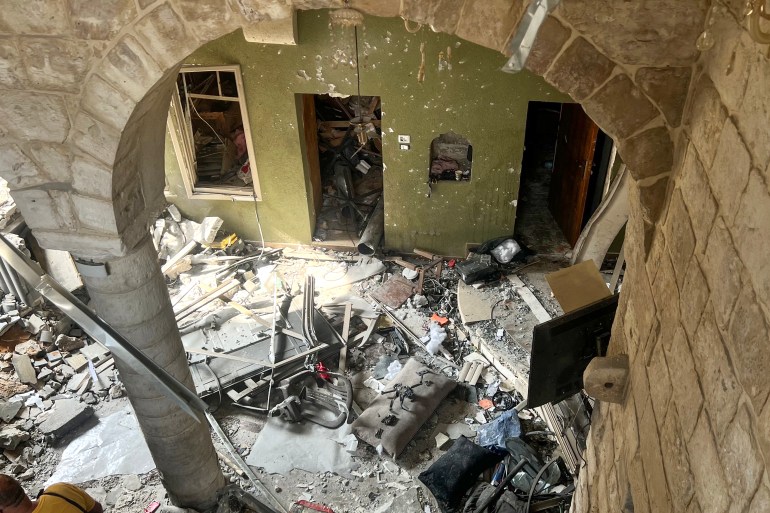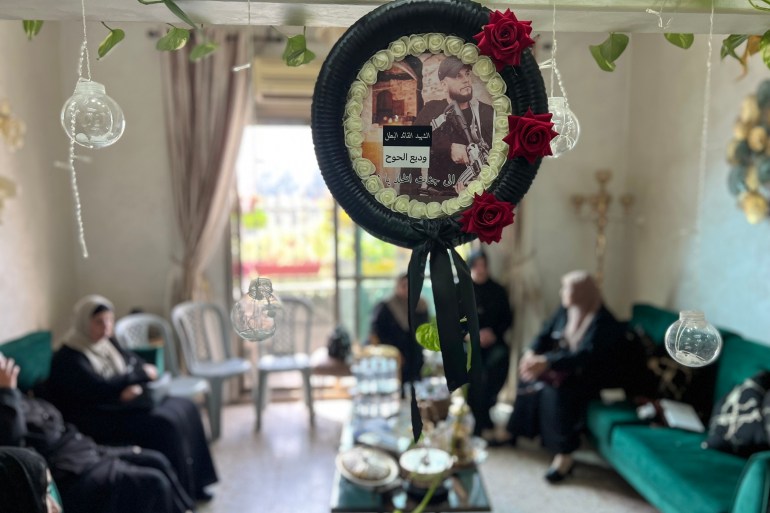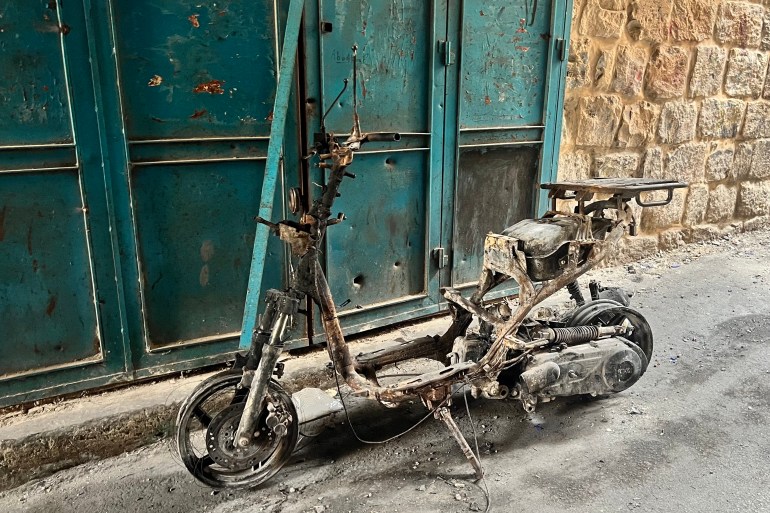Inside the Lions’ Den: Will Palestinian resistance keep growing?
Nablus’ Old City has emerged as a hub of armed resistance in the occupied West Bank, which Israel wants to crush.

Nablus, occupied West Bank – Traces of blood still stain the floor of Wadee al-Hawah’s home in the Yasmineh quarter deep inside the Old City of Nablus in the Israeli-occupied West Bank.
Dozens of bullets, shrapnel from projectiles, and remnants of several armed drones that exploded were scattered among piles of rubble and wrecked furniture.
Keep reading
list of 3 itemsTurnout low, and Palestinians divided, after Israel elections
Spotlighting Palestinian culture, despite Israeli restrictions
Everything except the 150-year-old stone walls was destroyed in Israel’s attack on the house on October 25.
Israeli forces launched a large-scale raid on Nablus that night – the biggest in recent weeks – killing five Palestinian men, including three who were members of the Lions’ Den Palestinian armed resistance group.
The faces of the five men killed on October 25 have been plastered across the cobblestone alleyways of the Old City.
The group’s most senior commander, 31-year-old Wadee al-Hawah, was assassinated in his home. Several other fighters were inside the house during the hours-long attack, including Mishal Baghdadi, aged 27, who was also killed.

Sitting in her apartment among a group of female family members, neighbours and friends, all donned in black, 33-year-old Sabreen al-Hawah is filled with what she says is pride and sadness over her slain brother.
“Wadee was a lion in every meaning of the word,” she told Al Jazeera in her home five days after the killings. “He died a dignified death and did not back down on any of his principles.”
Sabreen said while she knew her brother was a fighter and was wanted, he did not tell her anything else: “We only recently found out that he would go out shooting at checkpoints, that he would publish all the statements by the Lions’ Den. The men would gather in his house.”

‘Sending a message’
Al-Hawah’s killing is the latest in a series of Israeli operations targeting Palestinian fighters in the occupied West Bank since June 2021.
In March 2022, following a string of attacks by Palestinians that killed 19 people in Israel, the Israeli army launched an operation it calls Break the Wave, through which it is attempting to crush a phenomenon of growing armed resistance, particularly in Nablus and Jenin, by carrying out near-daily raids, killings and arrests in the two northern West Bank cities.
Israel’s three-day assault on the blockaded Gaza Strip in August, in which at least 49 Palestinians, including 17 children, were killed, was also conducted as part of that campaign.
The emergence of the Lions’ Den comes as public support for armed resistance increases among Palestinians. It is not the first new armed group to emerge: In September 2021, the Jenin Brigades, affiliated mostly with the Gaza-based Palestinian Islamic Jihad (PIJ), announced itself. In May 2022, a similar group also affiliated with the PIJ – the Nablus Brigades – was formed.
While its roots go back to February 2022, the Lions’ Den formally emerged in September.
“We are a group and not an organisation. Anyone who wants to resist the occupation is welcome,” one fighter told Al Jazeera in the old city of Nablus, adding that members use rifles they acquired on their own and not in an organised or funded manner.
“It’s about sending a message [to Israel], that we will not sit idly by,” he said. “We know we can’t liberate Palestine now, but we will leave this to the next generation.”
PA and Israeli pressure
The effect of these groups has been evident from the sharp increase in shooting operations at checkpoints, and killings of Israeli soldiers and settlers over the past two months. The Lions’ Den has since taken the responsibility for several shootings.
The group has gained support in the past few months, particularly after the killing of Ibrahim al-Nabulsi. Thousands have turned up for the funerals of dead fighters, and demands made to the public by the Lions’ Den have led to general strikes and protests.
The fighters’ refusal to identify with any particular political party or side has caused problems for Israel and the Palestinian Authority (PA).
“These youth have no political hope. Abu Mazen [PA President Mahmoud Abbas] is sitting there saying let’s negotiate, while the popularity of the Lions’ Den increased,” a senior Fatah official in the Old City of Nablus, who wished to remain anonymous, told Al Jazeera.
He noted that the group had dozens of members and is made up of fighters aged between 18 to 25. “They found protection in the tight alleyways and the adjacent rooftops of the Old City,” he continued, adding that many of them had served time in PA prisons and Israeli prisons.
![Nablus resistance [Al Jazeera]](/wp-content/uploads/2022/11/IMG_7063.jpg?w=770&resize=770%2C513)
Since February, a number of Lions’ Den fighters have either been killed or seriously wounded by Israel, or have handed themselves and their weapons over to the PA in exchange for amnesty from Israel, granted they serve time in PA prisons. “They are being fought against by two sides, the PA has told them to hand in their weapons,” the official said.
The PA has been offering deals to fighters from the Lions’ Den, including employment in the security forces, similar to what happened at the end of the second Intifada in the 2000s.
“The PA presented Wadee with temptations,” said Sabreen. “In a meeting with officials two days before he was martyred, they told him we’ll give you a salary of $6,000 if you work with us. You’ll get a house and a car. He was completely against it,” she explained.
In September, clashes broke out between Palestinian fighters and PA security forces in the centre of Nablus, after the latter arrested two fighters, including Musab Shtayyeh, a member of the Lions’ Den and one of the most sought-after ones on Israel’s wanted list.
![Nablus resistance [Al Jazeera]](/wp-content/uploads/2022/11/IMG_7150.jpeg?w=770&resize=770%2C578)
Future of resistance
On October 23, days before the killing of the five men in Nablus and just a few metres away from Wadee al-Hawah’s home, Palestinians accuse Israel of killing Tamer Kilani, a commander in the Lions’ Den. A bomb planted on a motorcycle detonated as he walked by.
The Israeli army has not commented on Kilani’s death.
The 33-year-old fighter, who was publicly affiliated with the PFLP (The Popular Front for the Liberation of Palestine), had defected from the PA’s presidential guard.
Wearing a thread necklace with a photo of Kilani, rifle in hand, the slain fighter’s father, 56-year-old Sufian, said his son had been wanted by Israel after he left the security services. He was then detained in Israeli prisons for four years in 2014, before being imprisoned by the PA for several months after his release.
“The men of this country face either prison or martyrdom, so I expected this for Tamer at any minute,” continued Sufian.
“Tamer was 13 when he was injured by live ammunition from the [Israeli] occupation forces during confrontations, and 17 when he was first detained,” he said. “I still have a photo of him as a teenager butting heads with an Israeli soldier in [the West Bank town of] Huwwara, carrying the Palestinian flag.”

The killing of Wadee al-Hawah, Tamer Kilani and others before them has represented a blow to Lions’ Den, but, despite Israeli and PA pressure, new groups are emerging.
Last week, the Balata Brigades, an armed group that grew out of the refugee camp in Nablus city, announced itself to the public. Armed operations have also spread to the cities of Jerusalem and Hebron.
“The fighters’ confidence is not shaking,” said the Fatah official in Nablus. “The more youth they [Israel] assassinate the more want to join the resistance.”